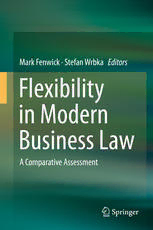Table Of ContentMark Fenwick · Stefan Wrbka Editors
Flexibility
in Modern
Business Law
A Comparative Assessment
Flexibility in Modern Business Law
ThiSisaFMBlankPage
Mark Fenwick (cid:129) Stefan Wrbka
Editors
Flexibility in Modern
Business Law
A Comparative Assessment
Editors
MarkFenwick StefanWrbka
FacultyofLaw FacultyofLaw
KyushuUniversity KyushuUniversity
Fukuoka,Fukuoka Fukuoka,Fukuoka
Japan Japan
ISBN978-4-431-55786-9 ISBN978-4-431-55787-6 (eBook)
DOI10.1007/978-4-431-55787-6
LibraryofCongressControlNumber: 2015958518
SpringerTokyoHeidelbergNewYorkDordrechtLondon
©SpringerJapan2016
Thisworkissubjecttocopyright.AllrightsarereservedbythePublisher,whetherthewholeorpartof
the material is concerned, specifically the rights of translation, reprinting, reuse of illustrations,
recitation, broadcasting, reproduction on microfilms or in any other physical way, and transmission
or information storage and retrieval, electronic adaptation, computer software, or by similar or
dissimilarmethodologynowknownorhereafterdeveloped.
The use of general descriptive names, registered names, trademarks, service marks, etc. in this
publicationdoesnotimply,evenintheabsenceofaspecificstatement,thatsuchnamesareexempt
fromtherelevantprotectivelawsandregulationsandthereforefreeforgeneraluse.
Thepublisher,theauthorsandtheeditorsaresafetoassumethattheadviceandinformationinthis
book are believed to be true and accurate at the date of publication. Neither the publisher nor the
authors or the editors give a warranty, express or implied, with respect to the material contained
hereinorforanyerrorsoromissionsthatmayhavebeenmade.
Printedonacid-freepaper
SpringerJapanKKispartofSpringerScience+BusinessMedia(www.springer.com)
Contents
TheFlexibilityofLawandItsLimitsinContemporaryBusiness
Regulation. . . . . . . . . . . . . . . . . . . . . . . . . . . . . . . . . . . . . . . . . . . . . . . 1
MarkFenwickandStefanWrbka
PartI ThePerspectiveoftheLawmaker
ThePotentialandLimitsofTeleologicalReductionShownwiththe
ExampleoftheAustrianWarrantyRegime. . . . . . . . . . . . . . . . . . . . . . 15
StefanWrbka
TheAustrianCivilLawCompanyasanExampleofaSuccessful
Company. . . . . . . . . . . . . . . . . . . . . . . . . . . . . . . . . . . . . . . . . . . . . . . . 37
DanieleMattiangeliandLisaKatharinaPromok
FromtheBoardroomtotheCornerStore:Globalization,
LawandEconomicOrganization. . . . . . . . . . . . . . . . . . . . . . . . . . . . . . 49
SeanMcGinty
TheNovelist’sArtisticFreedomv.HisProtagonist’sRightsof
Personality:AComparisonBetweenGermanand
U.S.-AmericanLaw. . . . . . . . . . . . . . . . . . . . . . . . . . . . . . . . . . . . . . . . 69
ChristianGomille
PartII ThePerspectiveoftheRegulator
DelayedLeniencyApplications:TheUnfortunateButPredictable
OutcomeoftheFlexibleLeniencyPoliciesUndertheChinese
AntimonopolyLaw. . . . . . . . . . . . . . . . . . . . . . . . . . . . . . . . . . . . . . . . . 91
StevenVanUytselandYingBi
Investor-StateArbitration:ATaleofEndlessObstacles?. . . . . . . . . . . 123
ClaudiaReith
v
vi Contents
PartIII ThePerspectiveofBusiness
TheNewCorporateCriminalLawandTransnationalLegalRisk. . . . . 149
MarkFenwick
ConsumerCreditLawintheEuropeanUnionandJapan:
AComparativeStudy. . . . . . . . . . . . . . . . . . . . . . . . . . . . . . . . . . . . . . . 173
JarlJacob
‘Plan-LikeArchitectures’forMutualTrustintheCloud. . . .. . . . . . .. 199
MarceloCorrales
Index. . . . . . . . . . . . . . . . . . . . . . . . . . . . . . . . . . . . . . . . . . . . . . . . . . . 227
Contributors
YingBi GuanghuaLawSchool,ZhejiangUniversity,Hangzhou,China
MarceloCorrales InstituteforLegalInformatics,Hanover,Germany
GraduateSchoolofLaw,KyushuUniversity,Fukuoka,Japan
MarkFenwick FacultyofLaw,KyushuUniversity,Fukuoka,Japan
ChristianGomille FacultyofLaw,UniversityofAugsburg,Augsburg,Germany
JarlJacob GraduateSchoolofLaw,KyushuUniversity,Fukuoka,Japan
DanieleMattiangeli FacultyofLaw,UniversityofSalzburg,Salzburg,Austria
SeanMcGinty FacultyofLaw,NagoyaUniversity,Nagoya,Japan
LisaKatharinaPromok FacultyofLaw,UniversityofSalzburg,Salzburg,Austria
ClaudiaReith FacultyofLaw,UniversityofSalzburg,Salzburg,Austria
StevenVanUytsel FacultyofLaw,KyushuUniversity,Fukuoka,Japan
StefanWrbka FacultyofLaw,KyushuUniversity,Fukuoka,Japan
vii
The Flexibility of Law and Its Limits
in Contemporary Business Regulation
MarkFenwickandStefanWrbka
Contents
1 Introduction................................................................................... 1
2 TheDemandforFlexibilityinBusinessRegulation........................................ 2
3 Chapters....................................................................................... 4
References........................................................................................ 12
1 Introduction
Overthelastthreedecades,therapidpaceoftechnologicalchange,transformations
in the composition of markets and the emergence of global production capacities
andserviceprovidershavecreatedmanynewopportunitiesforbusiness,aswellas
consumers. Globalization is the new and irreversible economic reality of our age.
Clearlytheseeconomicchangeshavecontributedtothecreationofnewpressures
on,andexpectationsof,thosefieldsoflawconnectedtotheregulationofbusiness,
particularlycross-borderbusiness.Lawmakersandregulatorshavebeencompelled
torespondtothenewdemandsandchallengescreatedbytheemergenceofaglobal
economy.Newexpectationsoflaw–inparticular,thatitbemoreagileorflexiblein
regulating the market economy – have prompted law-makers and regulators in
multiple jurisdictions to adopt various novel regulatory techniques and legal
formstorespondtothischallenge.
In many cases, these adaptations in domestic law have entailed compromising
traditional legal principles – such as legal certainty – in favor of empowering
regulators with greater discretion than has traditionally been permitted in modern
legalinstitutions.These changes raiseimportant,butdifficult,questionsabout the
M.Fenwick•S.Wrbka(*)
FacultyofLaw,KyushuUniversity,Fukuoka,Japan
e-mail:[email protected]
©SpringerJapan2016 1
M.Fenwick,S.Wrbka(eds.),FlexibilityinModernBusinessLaw,
DOI10.1007/978-4-431-55787-6_1
2 M.FenwickandS.Wrbka
balance between fairness and efficiency, as well as the relationship between the
publicandprivategood.
From the perspective of companies, the already weighty challenges of doing
business in a global economy are compounded by the additional challenge of
navigatingtheresultingmosaicofregulatoryregimes.Theprofileoflegalriskfor
modernbusinessisrenderedhighlyunstablebythefactoftransnationaloperations,
but the additional uncertainties created by the fact of diminishing legal certainty
and the relentless pace of law reform becomes a further source of legal risk and
additionalcosts.Thebenefitsoftheseadditionalrisksandcostsareoftenuncertain,
furthercompoundingthechallengesforbusinessenterprises.
The aim of this book is to bring together scholars from different fields of
economic and business law in order to map some of the legal responses to the
challengesofeconomicglobalization,focusinginparticularonthisquestionofthe
shiftingmeaningofflexibilityinthecontextofcontemporarybusinessregulation.
Inthisintroductorychapter,wewouldliketoprovidesomebackgroundandcontext
tothediscussionthatfollows,aswellasanoverviewofindividualchapters.
2 The Demand for Flexibility in Business Regulation
This volume is intended as a contribution to debates on business regulation,
focusing on this theme of flexibility. Although the topic of flexibility can be
found in much of the literature, one important development in this area was the
1992publicationofResponsiveRegulationbyIanAyresandJohnBraithwaite.1In
this work, Ayres and Braithwaite attempted to transcend the debate between
advocates of state-orchestrated command and control measures and advocates of
complianceandmoremarketoriented,de-regulationbyproposinganewapproach.
The central claim of ‘responsive regulation’ was that regulatory measures – laws
andpoliciesbroadlydefined–aremorelikelytobeeffectivewhentheregulatoris
abletoutilizeinaflexiblemanneran“enforcementpyramid”comprisingmultiple
regulatorymeasures.Inparticular,arangeofenforcementsanctions rangingfrom
persuasion,atthe“base”ofthepyramidthroughwarningsandcivilsanctionsupto
criminalpenalties,atthe“top”.
Accordingtothisindividualizedapproach,regulationofaparticularfirmshould
startatthebaseofthepyramid–i.e.withpersuasion,educationandwarnings–and
then, in the event that this approach proves ineffective, escalate to more punitive
measures. If the regulated company “knows” that more severe enforcement is
conditioned on their rejection of cooperation then a strong incentive is created to
cooperate.Equally,regulatedentitiesknowthatcooperationwillresultin“softer”
sanctions, as the company is moved “down” the pyramid. In this way, regulators
1AyresandBraithwaite(1992).

